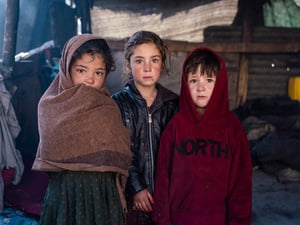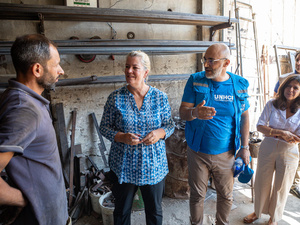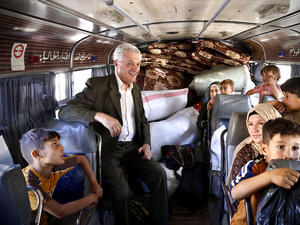Large influx of Syrians seen into Iraq's Kurdistan region on Thursday
Large influx of Syrians seen into Iraq's Kurdistan region on Thursday
Thousands of Syrians crossed into northern Iraq yesterday (August 15th) in a sudden, massive movement. UNHCR field officers present described waves of people "streaming" over the recently constructed bridge at Peshkhabour.
The factors behind this sudden movement are not fully clear to us, and since last night we have not seen further large scale crossings. Some of the Syrians had reportedly been waiting near the Tigris River for two to three days encamped at a makeshift site. UNHCR monitors at the border saw scores of buses arriving on the Syrian side dropping off more people seeking to cross over. Both the Syrian and Iraqi sides of the frontier at the Peshkhabour crossing are normally tightly controlled.
The first group of Syrians, some 750 persons, crossed over the pontoon bridge at Peshkhabour at the Tigris River before noon. Later in the afternoon a much larger group of 5,000 to 7,000 people followed.
The vast majority of the new arrivals are families (women, children and elderly persons) mainly from Aleppo, Efrin, Hassake and Qamishly. Some families have told us they have relatives residing in northern Iraq, and some students traveling alone said that they had been studying in northern Iraq and had only returned to Syria over the recent Eid holidays.
UNHCR and partner agency teams, together with local authorities worked into the early hours of this morning to aid the new arrivals. UNHCR, its partners and the authorities provided water and food to the new arrivals. IOM and the Kurdistan Regional Government provided hundreds of buses to move the refugees onwards to Dohuk and Erbil.
At Erbil, about 2,000 of the new arrivals are now encamped at a site in Kawergost town where UNHCR has established an emergency transit/reception area. Some of the new arrivals are sheltered under tents already installed by UNHCR. Other new arrivals are reportedly staying in mosques or residing with family or friends who reside in the area.
UNHCR is working with the Kurdistan Regional Government authorities, other UN agencies and NGO partners to establish a camp at Darashakran a short distance from the emergency transit site. This should open in two weeks, and our hope is it will relieve pressure at the crowded Domiz camp and enable refugees currently living in costly rented accommodation to move to a UNHCR-assisted camp.
UNHCR is grateful to the Iraqi authorities and particularly the Kurdistan Regional Government for their involvement in negotiations to permit the new arrivals to cross and the transport and other assistance that was provided at the frontier.
As of today 1,916,387 Syrians have fled the war and registered as refugees or applied for registration. Two-thirds of these have arrived this year. There are now more than 684,000 Syrian refugees in Lebanon, 516,000 in Jordan, 434,000 in Turkey, 154,000 in Iraq (not including yesterday's arrivals) and 107,000 in Egypt.
Governments in the region are carefully managing their borders with Syria mainly due to their own national security concerns, but refugees continue to cross into neighbouring countries in a gradual manner. UNHCR continues to urge countries in the region and further afield to keep borders open and to receive all Syrians who seek protection.
For more information, please contact:
- In Amman, Peter Kessler at +962 79 631 79 01 or [email protected]
- In Geneva, Adrian Edwards at +41 79 557 91 20 or [email protected]
- In Geneva, Dan McNorton at +41 79 217 30 11 or [email protected]







